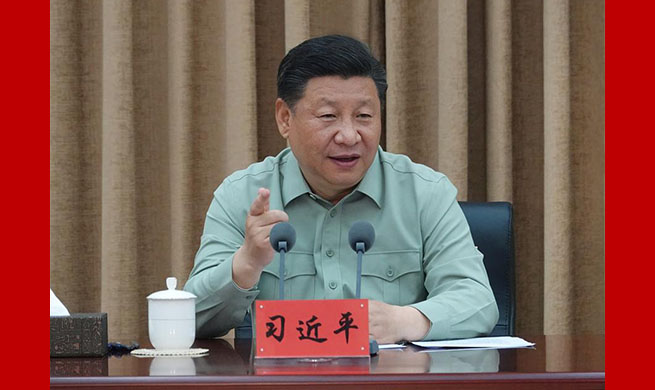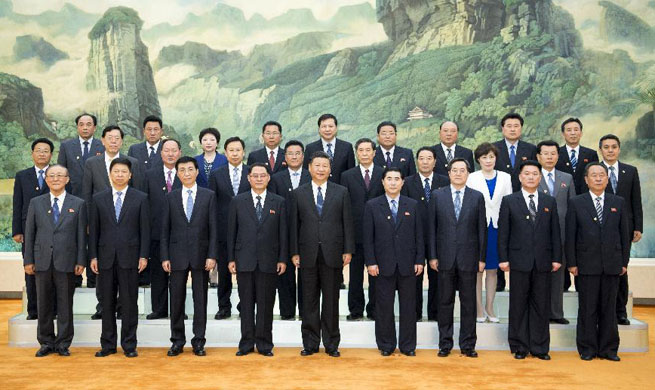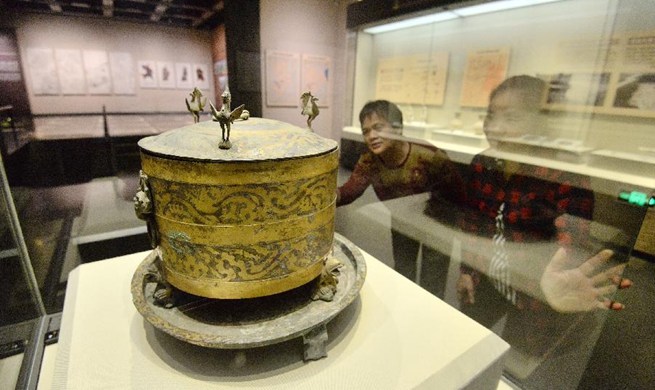ANKARA, May 17 (Xinhua) -- The U.S. sentence on a Turkish banker for violating U.S. sanctions on Iran, despite Turkey's warnings, is viewed as an additional source of tension in the already strained relationship between the two NATO partners.
Mehmet Hakan Atilla, the 47-year-old deputy CEO of a Turkish state bank Halkbank, has been sentenced Wednesday in a New York court to serve 32 months in prison.
However, the sentence is significantly lower than the 15-year minimum demanded by prosecutors and Atilla has the right to appeal.
He was convicted in January in a trial that increased tensions between Ankara and Washington, and Turkish president Recep Tayyip Erdogan has condemned it as a political attack, a "conspiracy" against his government.
The U.S. government's witness, Turkish-Iranian gold trader Reza Zarrab, suggested in his testimony that Turkey's president personally approved the sanctions-evasion scheme in 2012 when he was the prime minister.
Zarrab, who pleaded guilty and agreed to cooperate with the authorities, testified that he had also paid bribes to Zafer Caglayan, Turkey's then finance minister, and Suleyman Aslan, the general manager of Halkbank, for assistance in carrying out the scheme.
A day before sentencing, Erdogan made it clear that his government wanted Atilla's release as soon as possible, vouching for his innocence.
"If Atilla is going to be declared a criminal, that would be almost equivalent to declaring the Republic of Turkey a criminal," Erdogan said in London in an interview with Bloomberg TV channel.
Observers believed that his sentence is much more lenient than expected. Since Atilla has served time in prison since his arrest in March 2017 at the end of a business trip, he will be free to return to Turkey in 18 months.
Before his sentencing, Atilla's lawyers had asked the judge, Richard M. Berman of Federal District Court, to "temper justice with mercy."
Prosecutors told the judge that Atilla was "a key player in massively undermining" the efforts of the United States and other nations in the sanctions that would deprive Iran of "funding its malign and deadly activities," referring to its pursuit of nuclear weapons and ballistic missiles, and its support of terrorism.
But still, the judge said that Atilla lived "an exemplary life" in Turkey and that he was only following orders from the banks chief executive.
The Turkish Foreign Ministry slammed in a written statement the decision of the U.S. court and accused it of relying on "forged evidence and false statements fabricated by the Fethullahist Terrorist Organization," followers of the exiled cleric Fethullah Gulen in the United States, accused by Ankara of orchestrating a failed coup against Erdogan in 2016.
"The process is inconsistent with the principle of fair trial," added the statement.
The criminal proceedings against Atilla are separate from any punishment that may be imposed on Halkbank, and a penalty from the U.S. Treasury could be forthcoming, according to experts who argue that it would deal a blow to the Turkish banking system at a time when the country is battling with economic difficulties.
Rating agency Standard and Poors said in its report that the U.S. government may consider imposing fines or other penalties on Turkish financial institutions, including state-owned entities because of the Atilla case.
The agency lowered recently Turkey's credit rating in line with an economy facing difficulties because of double-digit inflation and unemployment coupled with a severe depreciation of the currency lira.
Experts predict that ahead of crucial presidential and legislative elections in June 24, Turkey will not likely remain quiet to the U.S. courts decision.
"This case has turned into a plot that interferes with our domestic affairs," said Cemil Ertem, chief economic adviser to President Erdogan in an interview to public broadcaster TRT World.
"Halkbank will pursue its rights and seek justice within the scope of international law, international banking regulations and financial regulations," indicated Ertem.
Ertem added that this case "will go down in history as a legal scandal." He also insisted that it would not harm the Turkish banking sector.
This legal case is the latest of a series of crisis between Ankara and Washington and coincided with the killing of 62 Palestinians in Gaza after the relocation the U.S. embassy from Tel Aviv to Jeruslam, which fueled deep anger in Turkey.
"We will naturally take action against this sentence, that's for sure, and steps will be discussed at the highest level. The U.S. administration is doing everything to alienate itself from the Turkish people who have totally lost confidence in its incendiary decisions," said a government source to Xinhua on condition of anonymity.
Turkey has recalled on Thursday its ambassadors in the United States and Israel over the U.S. President Donald Trump's administration decision to open its embassy in Jerusalem.
Ankara and Washington are at odds over several issues including conflicting policies on the Syrian war, the case of an U.S. pastor jailed in Turkey since the botched coup of 2016, and Turkey's purchase of Russian S-400 defense missiles, incompatible with NATO systems.
Turkish Foreign Minister Mevlut Cavusoglu is expected to meet his U.S. counterpart, Mike Pompeo, in Washington on July 4, according to the state-run Anadolu Agency, to try to diffuse at least some tension on the strained ties.

















